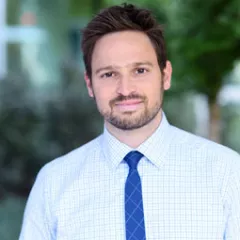
Etan Orgel, MD, MS
Dr. Etan Orgel is an attending physician within the Cancer and Blood Disease Institute. Dr. Orgel’s clinical specialty focuses on treating children with acute leukemia or lymphoma, and specifically those with higher risk and/or rare malignant hematology. He is an international expert in a rare type of acute leukemia named mixed phenotype acute leukemia (MPAL); while MPAL represents <2% of all acute leukemias, children with this type of leukemia have historically suffered a poor outcome.
Dr. Orgel’s research interest and clinical service roles align in pursuing the overarching goal to improve cancer care by reducing side effects of therapy. Dr. Orgel leads a “bedside-to-bench-and-back” research program focused on side effect reduction from chemotherapy. By working with laboratory partners, Dr. Orgel’s translational research develops robust, mechanism-driven clinical trials to test new preventive strategies and/or new uses of medications to improve chemotherapy delivery and reduce toxicities. Specific areas of emphasis for Dr. Orgel’s research include reducing the impact of obesity on cancer outcomes and preventing hearing loss from chemotherapy.
- Caring for children with acute lymphoblastic leukemia, acute myeloid leukemia, and mixed-phenotype acute leukemia (MPAL)
- Prevention of hearing loss from cancer therapy
- Reducing the impact of obesity on cancer outcomes
Education
Albert Einstein College of Medicine
Children's National Medical Center, Pediatrics
Children's Hospital Los Angeles, Pediatric Hematology/Oncology
Accomplishments
Pediatrics, American Board of Pediatrics
Pediatric Hematology/Oncology, American Board of Pediatrics
American Society of Pediatric Hematology/Oncology
American Society of Hematology
George Donnell Society of Pediatric Scientists, Children’s Hospital Los Angeles & The Saban Research Institute
2002 Summa Cum Laude, University of Pennsylvania
2006 Global Health Fellowship, Albert Einstein College of Medicine, Bronx, NY
2007 American Academy of Pediatrics International Travel Award
2011 American Society of Hematology Abstract Achievement Award, American Society of Hematology Annual Meeting, San Diego, CA
2011 Phi Kappa Phi Honor Society, Graduate Election, University Southern California
Publications
Orgel E, Sposto R, Malvar J, Seibel NL, Ladas EJ, Gaynon PS, and DR Freyer, "Impact on survival and toxicity by duration of weight extremes during treatment for pediatric acute lymphoblastic leukemia: A report from the Children's Oncology Group." Journal of Clinical Oncology, 32 (13); p1331 – 1337, 2014. [Highlighted for Editorial]
Orgel E, Tucci J, Alhushki W, Malvar J, Sposto R, Fu CH, Freyer DR, Abdel-Azim H, and SD Mittelman, “Obesity is associated with residual leukemia following induction therapy for childhood B-precursor acute lymphoblastic leukemia.” Blood, 124(26); p3932-3938, 2014
Orgel E, Jain S, Ji L, Pollick L, Si S, Finlay J, and DR Freyer, “Hearing loss among survivors of childhood brain tumors treated with an irradiation-sparing approach.” Pediatric Blood Cancer 58(6); p953 - 958, 2012
Orgel E, Ji L, Pastor W, and RJ Schore, “Infectious morbidity by catheter type in neutropenic children with cancer.” Pediatric Infectious Disease Journal, 33(3); p263 – 266, 2014.
Orgel E, Zung L, Ji L, Finklestein J, Feusner J, and DR Freyer, "Early cardiac outcomes following contemporary treatment for childhood acute myeloid leukemia: a North American perspective." Pediatric Blood Cancer, 60(9); p1528-1533, 2013. [Highlighted for Commentary]
Research
- Targeting obesity to improve therapy outcomes for childhood leukemia
- Preventing chemotherapy-induced permanent hearing loss
- Reducing treatment-related infectious morbidity and mortality
- Optimizing the use of the chemotherapy drug asparaginase during therapy
Research Overview
Dr. Orgel’s primary research direction lies in hypothesis-driven medical supportive care clinical trials founded on strong translational research collaborations. After completing a Master of Science in Clinical and Biomedical Investigations from the renowned Department of Preventive Medicine at the University of Southern California, he has led multiple epidemiological, retrospective, and prospective studies in cancer control and medical supportive care. His publications and interests primarily focus on treatment-related toxicities that dramatically impact the quality of life of survivors, including permanent hearing loss, cardiac toxicity, and poor bone health from chemotherapy regimens, or severely affect outcomes during therapy, such as obesity’s impact on survival from leukemia and infectious morbidity and mortality during leukemia therapy.
Media
Everyday Health - Childhood Leukemia Pain Relief Tips
Everyday Health - Helping Your Child Manage Side Effects of Leukemia Treatment
Science Daily - Standard BMI inadequate for tracking obesity during leukemia therapy
CHLA Press Release
Diet + Exercise + Chemo = Increased Survival in Youth with Leukemia
Cisplatin and Hearing Loss: Until Now, an Unquantified Risk
New Insights into Treating a Rare Leukemia
CHLA Blog
CHLA Experts to Present at 2024 American Society of Hematology Meeting
Will N-Acetylcysteine Be the Next Therapy to Prevent Cisplatin-Induced Hearing Loss?
FDA Approval Marks New Era for Preventing Cisplatin-Induced Hearing Loss
A Father Gives Thanks to CHLA for Saving His Son's Life
Diet + Exercise + Chemo = Increased Survival in Youth with Leukemia
Chemotherapy and Hearing Loss: Until Now, an Unquantified Risk
Long-Term Neurocognitive Effects Linked to Chemotherapy-Induced Hearing Loss


